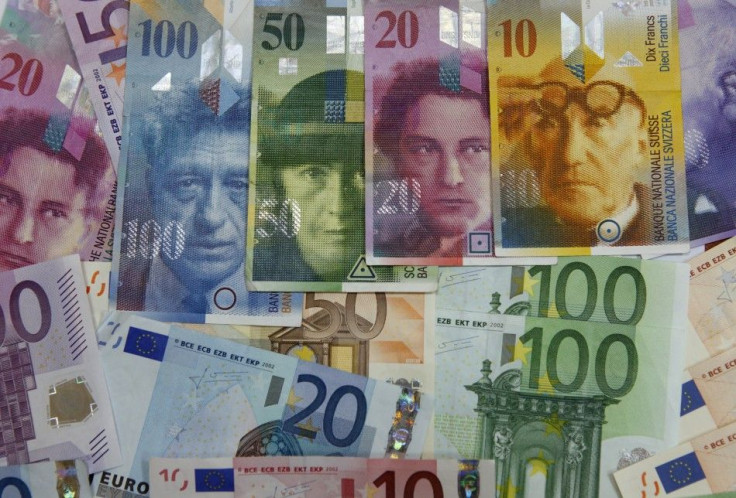Swiss Franc Falls to Two-Week Low

The Swiss franc dropped to two-week lows against the euro and dollar on Monday on speculation the Swiss National Bank could further act to curb strength in the currency by setting an exchange rate target as early as this week.
Analysts, however, said unless the rumors and rhetoric were backed by direct action from the SNB, losses in the franc could be limited as economic uncertainty in both the United States and Europe should keep it supported as a safe-haven currency.
The dollar, meanwhile, hit session troughs against the euro and yen after data showed the New York state manufacturing index contracted for a third straight month in August.
Speculation about a target level against the euro gained ground after Swiss newspaper SonntagsZeitung reported on Sunday the SNB would soon set a lower limit for the euro/Swiss pair.
Dean Popplewell, chief currency strategist at OANDA Corp. in Toronto said the euro/Swiss franc pair has been boosted by rumors the SNB could peg the franc to the euro possibly over the next couple of days.
"The euro has also gotten a bid because of investors unwinding their long Swiss franc positions that have become quite extended."
In early New York trading, the euro was up 1.6 percent at 1.12732 francs though it was off a high of 1.14584 hit earlier on trading platform EBS, the euro's strongest level since late July.
Current levels were way above last week's record low around 1.0075 francs.
Dealers said the sell-off in the franc was being driven by currency peg speculation ahead of a government meeting on Wednesday, with the SNB having key backing from Switzerland's largest political party.
OANDA's Popplewell said the market though has started to unwind long euro positions versus the franc as investors have started to focus on a meeting between French President Nicolas Sarkozy and German Chancellor Angela Merkel on Tuesday to discuss the debt crisis.
In the options markets, implied volatility in euro/Swiss, a a gauge of a currency pair's future movements, remained elevated in the shorter dates, with one-month volume trading around 24 percent. That was near last week's record level of around 32 percent, showing the market remains nervous about the potential for further sharp swings in the spot rate.
Shaun Osborne, chief currency strategist at TD Securities in Toronto, said the fact that the euro/Swiss franc rally has stalled after two days of aggressive short-covering reflected investors' belief that the SNB may consider the 1.10-1.15-franc area as the central point of a potential "fixed" trading band.
"Range trading may persist while the plans are formulated and until investors have a chance to assess the authorities' resolve to curb the Swiss franc's gains."
The dollar was up 0.9 percent at 0.78461 franc off sessions highs at 0.77920 and last week's record low of 0.70676.
Risk aversion following a U.S. sovereign downgrade and fears about a worsening euro zone debt crisis has pushed the franc to record highs, prompting the SNB to slash interest rates to near zero and threaten to weaken the Swiss currency.
The euro rose sharply against the dollar, helped by the single currency's gains versus the franc and a weaker-than-expected New York manufacturing data. In early New York trading, the euro was up more than one percent at $1.44296.
Analysts said any signs Germany might be softening its stance against a common euro zone bond was likely to support the euro. Markets were also keen on the outcome of Tuesday's meeting between Sarkozy and Merkel on the euro zone sovereign debt situation.
The dollar was little changed against the yen at 76.630 yen, not far from a record low of 76.250 hit in mid-March. Investors are reluctant to push the yen higher because of the threat of Japanese intervention to weaken it, but are equally loath to sell while the magnitude of the current slowdown remains uncertain.
© Copyright Thomson Reuters 2024. All rights reserved.






















